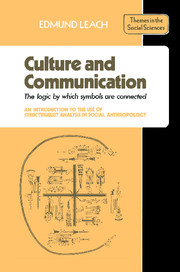 Culture and Communication
Culture and Communication Book contents
- Frontmatter
- Contents
- Culture and communication: the logic by which symbols are connected
- Introduction
- 1 Empiricists and rationalists: economic transactions and acts of communication
- 2 Problems of terminology
- 3 Objects, sense-images, concepts
- 4 Signals and indices
- 5 Transformations
- 6 Theories of magic and sorcery
- 7 The symbolic ordering of a man-made world: boundaries of social space and time
- 8 The material representation of abstract ideas: ritual condensation
- 9 Orchestral performance as a metaphor for ritual sequence
- 10 The physiological basis of sign/symbol sets
- 11 Mapping: time and space as reciprocal representations
- 12 Rank order and orientation
- 13 Examples of binary coding
- 14 Mating prescriptions and proscriptions
- 15 Logic and mytho-logic
- 16 Basic cosmology
- 17 Rites of transition (rites de passage)
- 18 The logic of sacrifice
- 19 Conclusion
- Bibliography
- Index
- Frontmatter
- Contents
- Culture and communication: the logic by which symbols are connected
- Introduction
- 1 Empiricists and rationalists: economic transactions and acts of communication
- 2 Problems of terminology
- 3 Objects, sense-images, concepts
- 4 Signals and indices
- 5 Transformations
- 6 Theories of magic and sorcery
- 7 The symbolic ordering of a man-made world: boundaries of social space and time
- 8 The material representation of abstract ideas: ritual condensation
- 9 Orchestral performance as a metaphor for ritual sequence
- 10 The physiological basis of sign/symbol sets
- 11 Mapping: time and space as reciprocal representations
- 12 Rank order and orientation
- 13 Examples of binary coding
- 14 Mating prescriptions and proscriptions
- 15 Logic and mytho-logic
- 16 Basic cosmology
- 17 Rites of transition (rites de passage)
- 18 The logic of sacrifice
- 19 Conclusion
- Bibliography
- Index
Summary
At the heart of the matter is our recognition that man is mortal and that illness threatens death. The central doctrine of all religion is the denial that death implies the automatic annihilation of the individual self.
But if ‘I’ am to survive after death as some sort of ‘other being’, then this ‘other being’ must be located in some ‘other world’ in some ‘other time’. The most fundamental characteristic of such ‘otherness’ is that it is the reverse of ordinary experience.
Concepts of deity derive from a similar reversal. As human beings we are conscious of our impotence; we are only able to modify the conditions of our material existence in very slight degree. But any concept of impotence implies the notion of omnipotence, which is again ‘other’. Deity, an omnipotent ‘other being’ occupying an ‘other world’ in ‘other time’, thus has very similar attributes to the deceased ‘other self’, and, in eschatological theorising, the two khids of ‘other world’ are often merged, so that deceased ancestors become gods.
But this poses a mytho-logical puzzle. If Deity, the source of ‘power’, is located in the other world, how can human beings have access to that power?
Religious practice is a response to this question. It is concerned with establishing a mediating bridge between ‘this world’ and ‘the other’ through which the omnipotent power of deity may be channelled to bring aid to impotent men.
Here let me remind you of what has been said previously about the innate sacred-taboo quality of all boundaries, which derives from their ambiguity and about the closely related principle that ‘power is located in dirt’ (pp. 35, 62).
- Type
- Chapter
- Information
- Culture and CommunicationThe Logic by which Symbols Are Connected. An Introduction to the Use of Structuralist Analysis in Social Anthropology, pp. 71 - 76Publisher: Cambridge University PressPrint publication year: 1976
